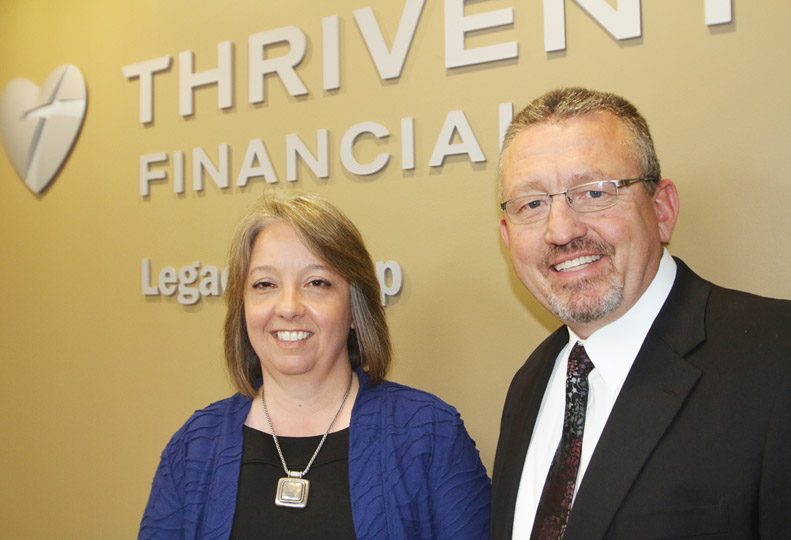
Home » Thrivent takes slow, steady approach to its growth
Thrivent takes slow, steady approach to its growth
Nonprofit now manages $700M in assets in INW

June 16, 2016
Thrivent Financial, a national, Christian-based financial services organization with offices here, says its financial health—regionally and locally—is stronger than ever despite a methodical approach to attracting new clients.
For more than a century, the organization and its predecessors were open only to Lutherans, but that all changed four years ago when it opened membership to Christians of all denominations.
“Just because we’re able to start serving the broader Christian market, doesn’t mean that we’re going, ‘Oh, sweet, come see us,’ ’’ says Bruce Schmitt, a Spokane-based partner in Thrivent and one of four Thrivent partners in Washington state. “It hasn’t been rapid growth. It’s been more of a slow, consistent growth.”
In Eastern Washington and North Idaho, Thrivent manages $700 million in assets for its 27,000 clients, which the organization refers to as its members, Schmitt says.
Based in Minneapolis, Thrivent is a Fortune 500 nonprofit that at the end of 2015 was managing $109 billion in assets for its 2.3 million clients, he says.
“We’re a big, significant player in the financial services industry in the country,” says Schmitt, who has worked with the organization for 30 years. He oversees daily operations here and helps financial advisers build their practices.
Thrivent offers individual retirement accounts, immediate and deferred annuities, mutual funds, life insurance, disability income insurance, long-term care insurance and Medicare supplement insurance. The majority of assets it manages are invested by individual church congregations and their members, Schmitt says.
Thrivent’s Eastern Washington headquarters are located in the Riverfront Office Building, at 534 E. Spokane Falls Blvd., where it occupies about 4,000 square feet of space.
Schmitt says 16 of Thrivent’s 24 Eastern Washington advisers—working as independent contractors—are located in offices in downtown Spokane, on Spokane’s North Side, and in Spokane Valley, Liberty Lake and Coeur d’Alene. The remaining advisers are located in Walla Walla, Wenatchee, the Tri-Cities and Yakima, Wash., and in Lewiston and Moscow, Idaho, he says.
Schmitt’s Eastern Washington unit is one of four in the state; the other three are in Western Washington, he says.
Thrivent is a nonprofit, tax exempt 501(c)(8), the equivalent of a fraternal beneficiary society, says Sharon Robertson, Thrivent’s community engagement leader, who also is based in Spokane. Robertson is charged with overseeing Thrivent’s charitable donations outreach programs.
“Because of our tax status, we’re mandated to turn those profits back into the community,” Robertson says.
Says Schmitt, “Money the company would otherwise pay in certain taxes instead goes to congregations, community organizations and causes our members care about. Our members own us and are actively involved in deciding where the money goes locally.”
Here, Thrivent’s members designated $500,000 to local nonprofits in Eastern Washington and North Idaho. Also, as part of the company’s mission, members donated more than 52,000 volunteer hours locally, Robertson says.
Two local charities here that Thrivent’s members have actively donated time and money to are Second Harvest Food Bank of the Inland Northwest and Habit Humanity-Spokane, Robertson says.
“We actually let our members make some of the decisions about where they want dollars to go, so consequently there are literally hundreds and hundreds of charities and not-for-profits that benefit from us,” Schmitt says.
Robertson says at a more intimate level, Thrivent also makes grant dollars available to its members to help friends and neighbors who may be struggling financially.
“If your neighbor down the street needs her roof repaired and she can’t afford to do it, and you’ve established a group of volunteers who can help in that effort, members can apply for mini-grants online to help with some of the costs,” says Robertson, who estimates that more than 90 percent of all grant requests receive funding.
A program called Thrivent Choice is a charitable grant program that gives members of Thrivent Financial the ability to recommend where funds get donated. In 2015, nearly 314,000 members across the country directed Thrivent Financial to donate more than $54 million in charitable outreach funds.
Almost 61 percent, or $32.8 million worth, of those donations were made to churches. Under the category of “other organizations,” $12.1 million was donated, $5.8 million to schools ranging from preschool to high school, $2 million to outdoor and campus ministries and $1.5 million to colleges, universities and seminaries, says Thrivent’s 2015 annual report.
Another program, called Thrivent Builds Homes, has been a partner with Habitat for Humanity for 25 years. In the 14-year period between 1991 and 2005, Thrivent helped Habitat build 500 homes nationwide. However, since then, Thrivent has stepped up its efforts and has built or renovated 4,800 homes, says the nonprofit’s annual report.
This year, Thrivent Financial members plan to provide funding for an additional 113 homes in the U.S. The organization says its funding commitment to Habitat for Humanity over the last 11 years amounts to more than $226 million.
Globally, through the Thrivent Builds Worldwide program, Thrivent Financial says it has built homes in at least 43 countries for families that otherwise couldn’t afford a home.
Thrivent’s roots germinated from the seeds of two different organizations that were established exclusively for Lutherans in the early 1900s. Aid Associations for Lutherans was founded in Wisconsin in 1902. Fifteen years later in Minneapolis, an unrelated organization was formed under the name Lutheran Brotherhood.
Thrivent’s predecessor organizations came to Spokane a number of decades ago, Schmitt says, adding that Thrivent has offices in every state.
The two organizations merged in 2002 and became Thrivent Financial for Lutherans. A decade later, the nonprofit changed to its current name.
“We’re an organization of Christian advisers working with other Christians, so we’re not the organization for everybody,” Schmitt says. “So how we use our dollars and how we use our time in building relationships and broadening our market is focused a little bit differently.”
Latest News Special Report Banking & Finance
Related Articles



